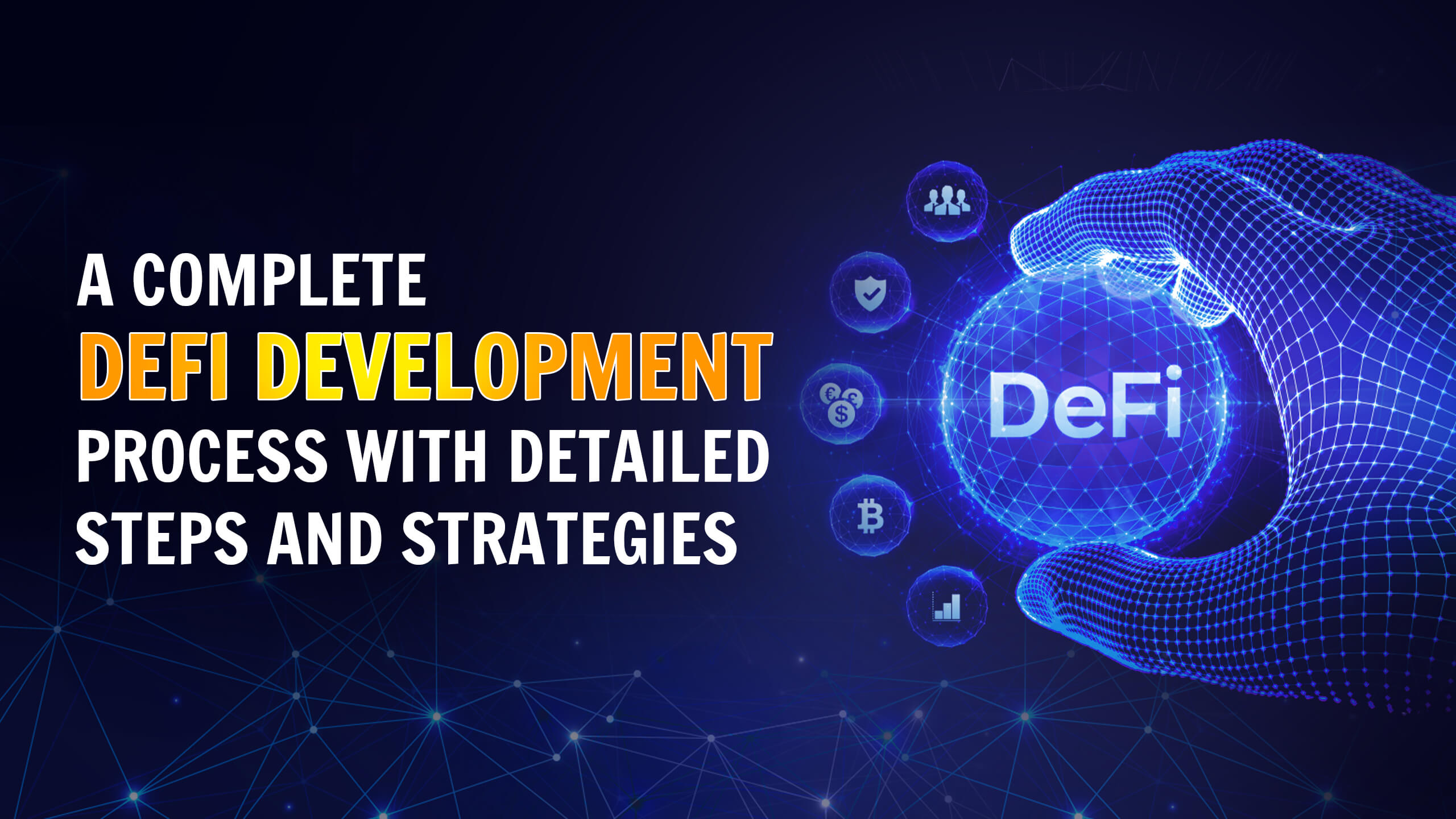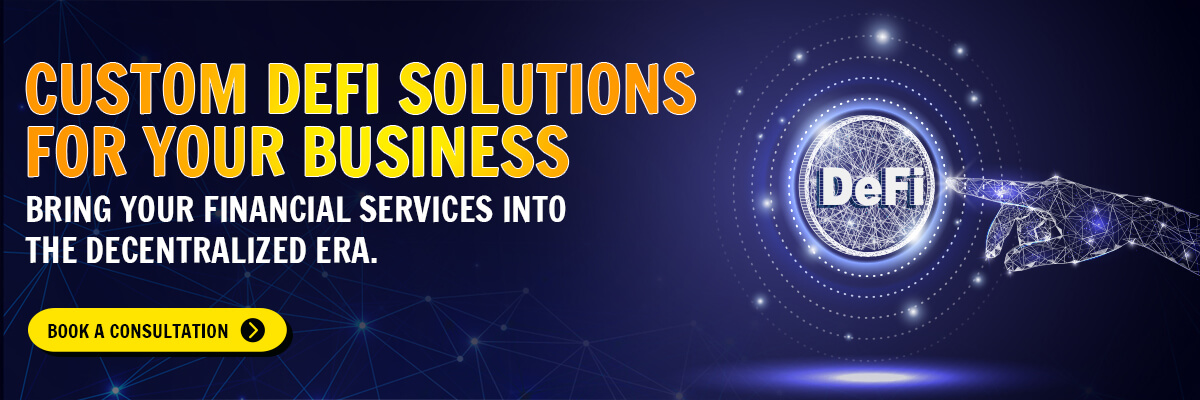DeFi is an innovative system that will fundamentally change global finance. In summary, DeFi is an open monetary system created through a technology called blockchain that may be accessed from just about anywhere on the internet. DeFi offers a significant paradigm shift in how people perceive and use financial services as it democratizes the field and eradicates intermediaries. Within the context of blockchain technologies and digital currencies, the recent evolution of the DeFi development process, platforms, and applications is of significant interest and importance. From Decentralized Exchanges (DEXs) to lending protocols, yield farming, and more, there are numerous exciting trends growing.
Comprehensive Guidelines for the DeFi Development Process
The development of products in DeFi is a specific, complicated type of work, which presupposes serious knowledge of the blockchain, knowledge of smart contract programming, the details of security, etc.
-
Project Ideation
In the DeFi development process, creativity and conception of a project come first. This entails generating ideas and outlining the main goals of the DeFi application. The DeFi development company collaborates closely with stakeholders to identify financial services—like lending, borrowing, trading, and insurance—that require decentralization. The project is grounded on a solid foundation by identifying opportunities and challenges through the conduct of competitor analysis and market research.
-
Identify the Architecture and Features of the App
This process involves figuring out the DeFi app’s architecture and functionalities. Create a DeFi app with appealing features and robust infrastructure based on the finalized use cases. Liquidity pools, wallets, and payment gateway integration writing smart contracts, and other things could fall under this category. The DeFi development company offers interoperability, scalability, and flexibility as the app has the necessary features.
-
Choose the Correct Blockchain
Blockchain is paramount in creating and testing your application in the DeFi space. It is therefore essential to have an efficient blockchain to support the creation of a DeFi application in a specific way. Ethereum is the most popular Ethereum blockchain platform for Defi app development. Choose an effective blockchain as the foundation for developing your DeFi application. With its proven standards and the existence of appealing smart contracts, Ethereum is the preferred one. Nevertheless, there can be other options depending on your particular issues, and these are the Polkadot, Solana, and Binance Smart Chain networks.
-
Smart Contract Development
Creating smart contracts is at the core of any DeFi service. Smart contracts are Ethereum contracts, which are self-executing and designed to streamline and safeguard the transactions on the blockchain by writing the terms of the contract directly into the code. DeFi development services aim to come up with robust, reliable, and powerful smart contract development and authoring.
To achieve these contracts, the development team uses examples of programming languages specific to Ethereum, such as Solidity. These contracts are compulsorily programmed with important features such as minting the tokens, provision of liquidity, and staking lending.
-
Creation of the User Interface
Building a DeFi application requires having a user interface that is both practical and intuitive. It serves as the entry point for people to interact with all of the potent features you’ve created. You may better comprehend the ideal interface structure by drawing out these user flows.
Construct wireframes and mockups to see how your interface will look.
The DeFI app’s user interface should be designed with simplicity and intuitiveness in mind. Although DeFi might be complicated, even non-techies should be able to use it easily thanks to a well-designed user interface.
-
Implementing Security Measures
An integral component of the DeFi development process is thorough testing. Making sure smart contracts and the program as a whole is safe and free of bugs is crucial, especially considering the monetary ramifications and unchangeable nature of blockchain transactions.
- Secure Coding: Smart contracts must be carefully written by developers. A badly drafted contract may contain vulnerabilities, and once it’s deployed, there won’t be a way to fix it.
- Testing: It consists of both integration and unit tests.
- Audits: You should hire a third-party company to carry out an audit once you have written and tested your smart contracts. Overflow problems and other possible security vulnerabilities will be found by the auditors.
- Bug Bounties: In return for pointing out security holes in your smart contracts, outside developers are invited to participate and earn rewards.
-
Secure Deployment
Perform extensive testing and quality assurance before deploying bespoke decentralized finance apps. Verify that every feature of your program is operating as it should. Verify that every functionality adheres to the intended goals and layout.
Examine the program from the viewpoint of the user. It contributes to a seamless UX and an intuitive user interface. Get input from a group of beta testers or early adopters, then make changes to your program in response to their suggestions.
Make sure that the DeFi development company satisfies all applicable legal and regulatory obligations. It could cover blockchain-specific legislation or data protection in your area.
-
Post-Deployment Monitoring and Maintenance
This is not the last step when it comes to the DeFi development process. A stringent process of auditing and maintenance is necessary to keep DeFi operational and effective in the future. This includes the monitoring of transaction volumes and speed as well as the general activity of the application users to ascertain any performance failings. Routine audits are crucial to identifying and resolving new security threats.
The DeFi development services also have to release new versions to introduce new functions, quality of service enhancement, security, and feedback from users, as well as new trends in the market. One more is customer support: When users are not able to troubleshoot problems on their own, a customer service phone number or online help will make the platform more reliable.
-
Community Building and Governance
There is a need to establish and foster community for the success and sustainability of a DeFi project. Holding discussions on Discord, Telegram, and other social networking sites enables people to participate provide feedback on the product, and add something to it. Incorporating decentralized governance ensures that all users have the right to vote and facilitates proposals and changes to the scheme’s operations.
This helps to keep the development process on track in terms of serving the interests of the community and building trust towards winning the community’s trust. The DeFi development services ensure that the project has a stable environment for its establishment and development as well as a mechanism for innovation.
Conclusion
This article outlines Web 3.0 India’s DeFi development process, through which a DeFi application or DeFi solution evolves from the idea to post-deployment. Such monitors and maintainers must have active community support to ensure longevity. It has become crucial to hire additional services from a DeFi development company that can help with foreseeing the future of the project and make it more efficient, in line with the current trends to promote DeFi development for projects.
 +91 95109 87700
+91 95109 87700 +44 20 3290 3710
+44 20 3290 3710




